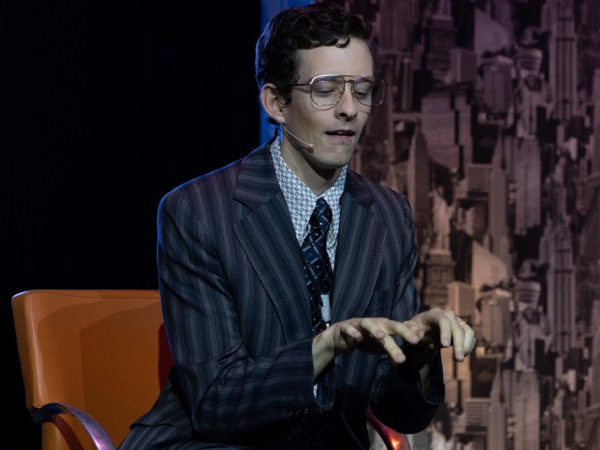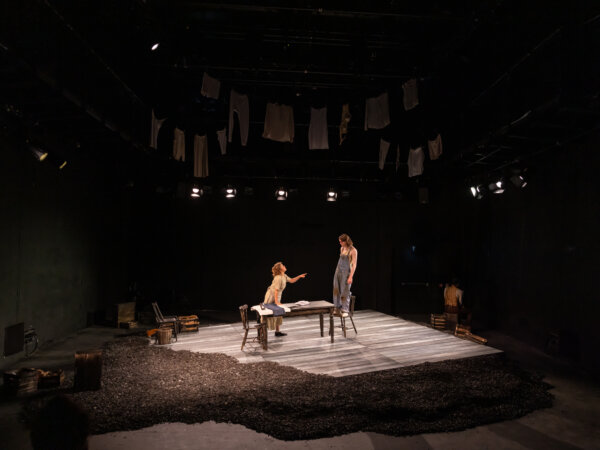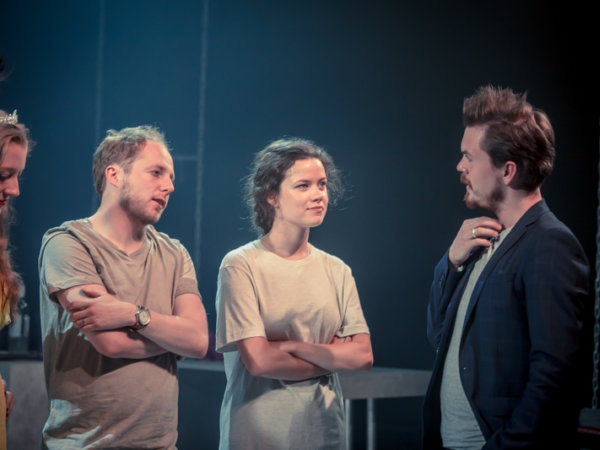
Postgraduate Degrees
Master of Fine Arts [MFA] in Theatre Producing
1 year / 2 years
The Master of Fine Arts Theatre Producing programme is the first of its kind on the island of Ireland - a dedicated programme for emerging talent. It is a distinctive, practice-based, one-year postgraduate degree, led by esteemed theatre professionals. Applications for 2025-2026 are now open. Deadline is May 31st, 2025.
Apply NowOverview
This MFA in Theatre Producing equips students of exceptional talent with the skills necessary to pursue a career in professional theatre and related industries through the development of skills, professional practices and creative approaches to theatre producing. It encourages a self-reflexive approach to learning with a view to developing independent thinking and collaboratively-focused producers. On completion of this postgraduate degree, students will be equipped to start work as theatre producers. They will qualify and graduate from Trinity College Dublin, The University of Dublin - see more on Trinity here.
Talented students from all over the world come to take part in our training, and graduates from our existing strands have had considerable success working as professional directors, designers and playwrights across Irish theatre and internationally.
The Theatre Producing programme has been designed in the context of the theatre industry and the reality facing emerging theatre producers today. Producers are now most commonly working alone, as sole traders, without the support of a wider institutional framework. As a result, they need to be resilient, resourceful and confident in a broad range of practical skills across the entire production process. Students will acquire the specific skills required to work as professional producers whilst also considering the evolution of the art form itself, as well as developments in the global theatre industry.
Collaboration is a vital part of the success of our postgraduate programmes. Students on the course will also participate in classes with our other students studying the Master of Fine Arts in Theatre Directing, Master of Fine Arts in Stage Design (Lighting, Costume and Set) and Masters of Fine Arts in Playwriting. These shared modules have been noted as particularly useful in building a community for graduates to draw upon after they complete their studies.
In addition to the core classes and workshops, individual and group tuition from the Head of Theatre Producing at The Lir Academy will be a key part of the training. In addition, masterclasses by visiting practitioners will supplement the student experience. The MFA will culminate in the students applying all the professional skills acquired through the taught modules in a fully staged theatrical production presented to a public audience. Productions will either be staged in The Lir Academy, or as part of Dublin Fringe Festival, our professional partner on the delivery of this programme. This will be further supported by industry placements from key partners such as the Dublin Theatre Festival and The Gate Theatre. This will also give students the opportunity to build relationships and their network. The students will reflect on the research, development and delivery of the production in a critically reflective creative journal.
Students can take this course either part-time (24 months) or full-time (12 months). Full-time and part-time students will take three concurrent modules in the first two terms. The final module (Module 5) will be taught in the third term and subsequent summer months (for full-time students) or in the second year of the course (for part-time students) and will culminate with a professional production staged in one of the performance studios at The Lir Academy. Term Three will be supplemented by an ongoing series of master classes from professional directors and theatre makers.
Careers
This MFA in Theatre Producing will upskill and equip students to specialise in this chosen area. It is tailored to provide talented individuals with the necessary skills to work as Theatre Producers and in the related industries.
Learn more about the experience of our MFA students in the video at this link and also at this link. Hear from course director and award-winning producer Matt Smyth at this link here.
More
Read about The Lir Academy Tutors here.
Contact admissions@thelir.ie for further queries.
Read our current prospectus here.
Please note that postgraduate applicants for Trinity College Dublin are expected to have a minimum educational level of an undergraduate degree (Level 8) at a second class honours level of 2:1 as part of the entry requirements for the University. However, due to the practical nature of our MFA programmes, exceptions may be made in circumstances where an applicant demonstrates the talent, aptitude and experience appropriate to the course. To discuss this further, please contact our admissions team - admissions@thelir.ie.
Applications for 2025-2026 are now open via the Trinity portal - click here. The extended deadline is May 31st. We recommend applying as soon as possible as places are now very limited, so that you can then make preparations to start your studies with us in September.
Application Details click to
The application for the programme must be submitted through the specific form available through the Trinity College Dublin website. The online form includes sections where applicants can submit:
a) Résumé/CV: a professional theatre CV, clearly listing your education, experience in theatre and theatre producing/directing/curating
b) References: two reference/testimonials; one from those familiar with your work and one from third level education. It is a good idea to reach out and ensure that those uploading your references are aware of your application and have received the notification to upload their testimonial from Trinity College Dublin
c) Personal Statement (max. 500 words): In this section, you may include why you wish to attend The Lir Academy, and why you wish to pursue a masters degree. You may expand on this statement within your Statement of Purpose, or you may elect to include this information on the former and indicate in the Personal Statement section that you will do so.
In addition to the information required on the online form submitted through Trinity College Dublin, you are also required to upload a copy of each of the following through the Additional Documents section on the application form:
a) Letter of Application: A letter that outlines your theatre education and theatre producing experience to date. This may also include experience in other areas of theatre, such as directing or curating. Please note, however, that applicants will require some producing experience to be accepted on to the course
b) Statement of Purpose: A statement outlining your ambitions in terms of theatre producing. In this you can include what theatre is to you, why you have chosen a career in theatre producing, the work you want to make, why you want to pursue a MFA in Theatre Producing and your future plans
c) Portfolio: This is of your theatrical or related work. This can be a visual and text-based overview of events you have worked on in any role e.g. director, creative, artist, technician, curator, event-organiser and production support. This will be used to assess your background and passion for performance. Should you be successful in securing an interview, they will also be incorporated into that process. We accept portfolios as PDFs, websites or in any other convenient format.
d) Critical Assessment: a critical assessment essay of recently produced work. This is an analysis of work produced the applicant. It is an overall evaluation of the process; from the initial artistic impulse, ambitions for the work, pre-production plans and the development of the work; an analysis of the process when working with designers, actors, directors and the overall production team, and finally a reflection and critical analysis of the work achieved and any learning outcomes.
It would be extremely helpful if you could name the files according to the following format when uploading: NameLastnamePortfolio, NameLastnameCV etc.
APPLICATION FORM FOR MFA THEATRE PRODUCING (BOTH FULL-TIME AND PART-TIME) IS THROUGH TRINITY COLLEGE DUBLIN AT THIS LINK.
Modules click to
Full-Time Programme (taught over 13 months from September 1st to the following end of September)
All modules are compulsory.
Michaelmas Term
1) Theatre in Context (10 ECTS) This module is shared across all MFA strands, including theatre directors, designers and playwrights. Students will attend five live theatre productions together over the course of the term and attend a weekly three-hour seminar. Part of each seminar will comprise a meeting with the artists, curators and practitioners who led the creation of the live performances attended by the students. Leading arts leaders, directors, funders and stakeholders will also be invited as guest speakers at the seminars.
2) Performing Arts Ecology (10 ECTS)
Students will learn about the leading public agencies, semi-state bodies and resource organisations which lead, fund, oversee and support all performing arts activities. Seminars will cover current governmental and departmental priorities as expressed in national and sectoral policy commitments as well as specific policy developments in areas such as Equality, Human Rights & Diversity, artist pay & conditions and spatial arts provision. Seminars will include industry guests to discuss issues of ethical concern to the performing arts sector. Students will also consider good governance practices and how successful organisations respond to changes in the performing arts ecology.
3) Producing Practices 1: Budgeting, Finances & Contracting (10 ECTS)
These seminars are designed to develop the student’s specific producing skills through practical exercises exploring different HR and finance deliverables including production budgets, sponsorship proposals, grant applications, production contracts and license agreements. Students will deliver their own documentation each week for discussion and critique. In addition, students will consider relevant finance, taxation, governance and HR legislation including recent amendments and potential legal developments in the future. Students will become conversant with all Irish funding sources as well as European funding opportunities through the Creative Europe programme.
Hilary Term
1) Contemporary Theatre Practice (10 ECTS)
This compulsory module will introduce students to a range of contemporary theatre practices. In advance of each seminar, students will read play texts and critical and view recordings of seminal 20th and 21st-century productions. Students will research leading international theatre artists and contextualize their productions with reference to theatre history. The principal aim of the course is to enable students to become conversant in the styles, forms, theories and practices that constitute contemporary theatre-making in Ireland and across the world. The Contemporary Theatre Practice module is shared by all Master in Fine Art students (directors, designers and playwrights).
Creative Leadership (10 ECTS)
Students will consider the building blocks available to lead on the development of original theatrical productions (play licencing and commissioning contract templates, project management strategies and skills etc) and will develop a suite of instruments required to deliver a specific production or artist development initiative (project Gant charts, writer’s contracts, dramaturgical support processes etc). Meetings with directors of leading theatre organisations will develop the student’s understanding of the challenges and opportunities inherent in institutional leadership. Consideration of vision documents and strategic plans will further develop the student’s understanding of creative leadership in action. Individual seminars will focus on crisis management strategies and resilience workshops will empower students to respond to the personal challenges of creative leadership.
2) Producing Practices 2: Venues, Audiences & Touring (10 ECTS)
The seminars are designed to develop the student’s specific producing skills through practical exercises exploring different production deliverables including venue hire contracts, marketing plans and touring budgets and schedules. Students will deliver their own documentation each week for discussion and critique
Trinity Term & Summer Months
Theatre Producing Projects (30 ECTS)
This module will be taught through individual supervision of students’ research, preparation and delivery of the production of a play or performance (of at least 45 minutes’ duration) for public viewing. Students will either produce a production in one of The Lir’s Studios as part of the annual Gradfest festival (working alongside MFA design and directing students) or as part of the Dublin Fringe Festival (working alongside early-career professional artists). Students will be supervised by the Strand Course Director. Students will also participate in a professional placement and complete a reflective journal which will be assessed by the Strand Course Director.
Part-Time Programme (taught over two years)
Year One
Contemporary Theatre Practice (10 ECTS)
Theatre in Context (10 ECTS)
Performing Arts Ecology (10 ECTS)
Creative Leadership (10 ECTS)
Year Two
Producing Practices 1: Budgeting, Finances & Contracting (10 ECTS)
Producing Practices 2: Venues, Audiences & Touring (10 ECTS)
Theatre Producing Projects (30 ECTS)
Fees click to
Fee Status
A breakdown of postgraduate EU fees can be found on Trinity's website.
To determine your fee status, read below.
You can also consult the flow chart provided by Trinity College to determine your fee status:
EU Fees Eligibility
A student is considered eligible for EU fees if they meet one or more of the following criteria:
- The student is ordinarily resident in the EU, EEA, Swiss Confederation or United Kingdom and has received full-time further or higher education in the EU for three of the five years immediately preceding admission;
- The student is ordinarily resident in the EU, EEA, Swiss Confederation or United Kingdom and has worked full-time in the EU for three of the five years immediately preceding admission or
- The student holds a passport from an EU State, EEA, Swiss Confederation or United Kingdom and has received full-time further or higher education in the EU for three of the five years immediately preceding admission.
Applications from children of the following are treated as EU applications:
- EU government officials living abroad
- Semi-state officials who are on assignment in countries outside the EU
- Volunteer development workers
- Certain EU officials as approved by the Department of Foreign Affairs
Non-EU Fees
If you do not satisfy the criteria for EU Fees, then you must pay non-EU Fee rate, regardless of nationality or citizenship (€ 22,8000 - AY 2024/25).
Students classified for fee purposes as non-EU will not be permitted to change their fee status following admission. This fee includes tuition fees and the SLC fee.
Fees for 2024/25
Full-time fees (EU/UK) - €12,530
Full-time fees (Non-EU) - €22,800
Part-time fees (EU/UK) - €6,260 p.a.
Part-time fees (Non-EU) - €13,460 p.a.
Details on additional student fees can be found at the link here.
Annual Review of Tuition fees and other charges by Trinity College Dublin:
Please note, tuition fees and other charges are subject to annual review by Trinity College Dublin which may result in a fee increase each year.
All students (Undergraduate and Postgraduate, EU & Non EU) on courses/programmes of study of more than one year should be aware that tuition fees and other charges (Commencement/graduation fee, Student Levies & Charges (SLC) fee) may be subject to increase annually. The annual revision is approved by Trinity’s Committee and College Board and typically increase by approximately 3% per annum or more in any given year.
For funding opportunities, please this link.
Apply NowBursarys, Scholarships and Funding click to
1. The Lir Academy Bursary
This fund is open to all EU students who have been offered a place on the Undergraduate Bachelor in Acting, Undergraduate Bachelor in Stage Management and Technical Theatre or any of the Postgraduate courses at The Lir, National Academy of Dramatic Art, or are already studying here.
Students can apply for the bursary once a place has been offered on the course.
Non-EU students cannot apply for The Lir Academy Bursary, but they are eligible for other Trinity College bursaries. See more information here.
2. SUSI Grant
The SUSI Grant can be accessed by EU and international students who have lived in Ireland for three out of the past five years. The grant is income-assessed and you can use the Eligibility Reckoner online to see if you qualify. See that at this link.
3. Trinity College Dublin Funding
Trinity College Dublin offers a variety of funding opportunities for EU and international students. You can see more at this link.
4. European Excellence Awards
A bursary towards fee costs for EU-fee status students. Applicants can only apply for it once they have been offered a place. Applications usually open in March and close at the end of June each year. If you are an EU-fee status student, you can read more about the European Excellence Awards at this link.
5. Higher Education Authority for non-EU/EEA countries
Each year the Higher Education Authority (HEA) run an International Education Scholarships Programme. Under the initiative, 60 scholarships will be provided for one-year study at Bachelor, Masters or PhD levels to successful candidates who have an offer of a place at an eligible Irish higher education institution. The offer is open to students from non-EU/EEA countries and is applicable to all fields of study. This will be updated annually on their website at this link.
MFA Theatre Producing Course Handbook 2024 - 25 click to
Download the course handbook here
MFA Theatre Producing Course Handbook“
The Lir Academy is already a leader in theatre training in so many areas - acting, stage management and technical theatre, direction, design and playwriting. This new MFA in Theatre Producing is the missing link. It promises to be transformative - not only for the people who undertake it, but for the entire theatre sector. It’s a groundbreaking course that will have a huge impact on the future development of theatre in Ireland.
Anne Clarke - Producer & Founder, Landmark Productions and Lir Board Member




